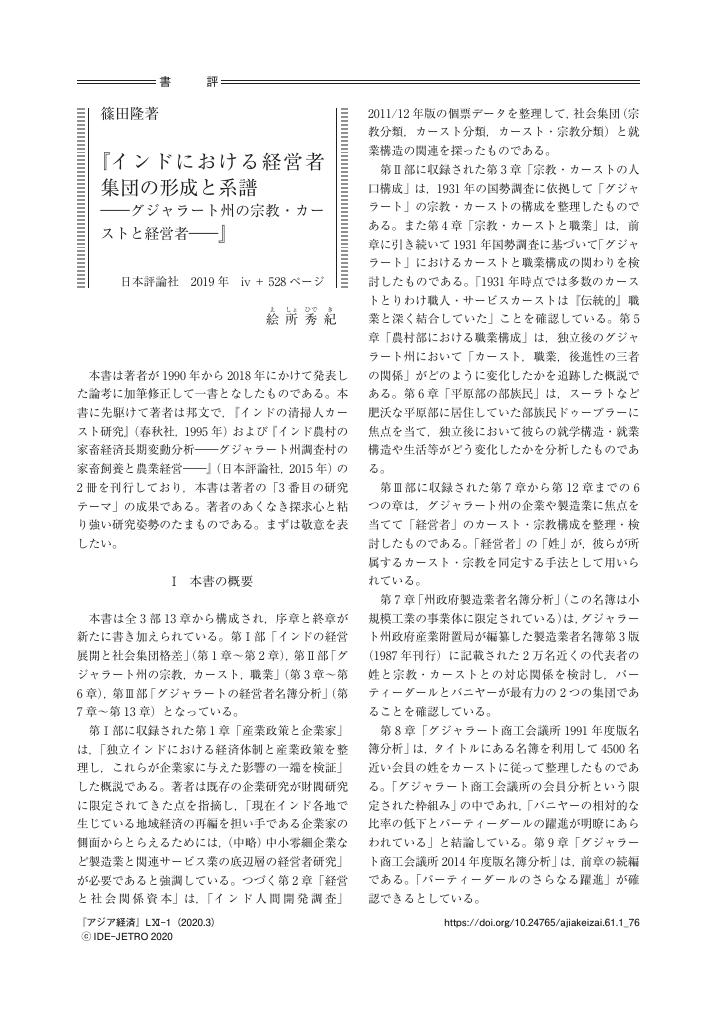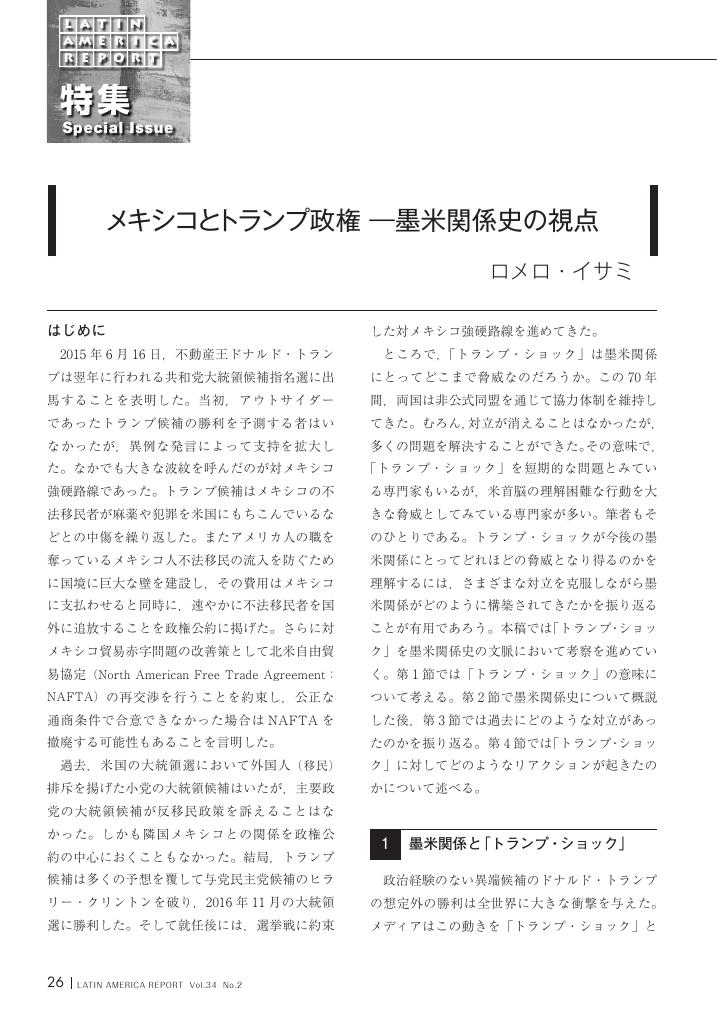1 0 0 0 OA 2019年のネパール 統合が進まない政府与党,国境をめぐるインドとの軋轢
- 著者
- 佐野 麻由子(さの まゆこ)
- 出版者
- 独立行政法人 日本貿易振興機構アジア経済研究所
- 雑誌
- アジア動向年報 (ISSN:09151109)
- 巻号頁・発行日
- vol.2020, pp.497-520, 2020 (Released:2020-12-17)
1 0 0 0 アゼルバイジャン外交と非同盟主義―イランとイスラエルの狭間―
- 著者
- 清水 学
- 出版者
- 独立行政法人 日本貿易振興機構アジア経済研究所
- 雑誌
- 中東レビュー
- 巻号頁・発行日
- vol.6, pp.99-119, 2019
<p>Azerbaijan, a land locked country in South Caucasia, gained independence in 1991 after the break-up of the USSR. It is surrounded by Russia, Iran, Armenia, Georgia, and Turkey and is compelled to depend on a balancing act in its diplomacy to protect its sovereignty and survive. In April 2018, it reiterated its intention to host the 2019 Summit of the Non-Aligned Movement (NAM) in Baku and take on the position of chairmanship of NAM for a 3-year term. It is to be noted that Azerbaijan took this decision at a time of heightened tensions in the region when the US unilaterally withdrew from the Joint Comprehensive Plan of Action, popularly known as the Iran nuclear deal. Azerbaijan has a border with northwestern Iran and has had a complicated relationship with it based on historical, ethnic, and religious ties. At the same time, Azerbaijan is the major supplier of oil to Israel, which is increasingly antagonistic to Iran. For the last decade, Israel and Iran have tried to gain Azerbaijan's favor by offering arms or adjusting their diplomatic stance to take into account the geopolitical importance of Azerbaijan. Iran switched from its tacit support to Armenia on the Nagorno Karabakh conflict to a more sympathetic understanding of Azerbaijan's position.</p><p>The Nagorno Karabakh issue has been the focal point of security and sovereignty for Azerbaijan, which claims that Nagorno Karabakh and its neighboring areas have been occupied illegally by Armenia. Since the latter half of 2018, Israel has raised the level of military cooperation with Azerbaijan by supplying more advanced arms, such as drones, while Iran strengthened its military links with Azerbaijan by enhancing its military contacts and cooperation. For Azerbaijan, the simultaneous deepening of military cooperation with the two influential and mutually antagonistic regional powers—Israel and Iran—is not inconsistent because it seeks to upgrade its own military capacity.</p><p>The NAM has not been given serious attention in the world politics since the end of the cold war. At the same time, the objective reality that the number of member states has increased cannot be denied. The purpose and definition of the NAM is still vague and allows member states to arrive at different versions of its objectives. The mediating capacity of the NAM to solve conflicts among the member states is, at best, marginal. However, the NAM is a forum where the participants—most of whom experienced colonial rule—can express strong or mild dissatisfaction with the present world regime, dominated by the West. In this sense, the role of NAM could be still flexible and effective under certain conditions in the fluid world political system. Azerbaijan utilizes the NAM to achieve a balance in its diplomatic relations in the present turbulent situation and strengthen its political position on the Nagorno Karabakh issue.</p>
1 0 0 0 OA アフリカゾウによる農作物被害とその対策 ――農民による命がけの追い払い――
- 著者
- 岩井 雪乃
- 出版者
- 独立行政法人 日本貿易振興機構アジア経済研究所
- 雑誌
- アフリカレポート (ISSN:09115552)
- 巻号頁・発行日
- vol.56, pp.93-99, 2018-10-04 (Released:2019-03-22)
- 参考文献数
- 7
1 0 0 0 マクロデータから読み解くAMLO政権下のメキシコ経済の実情
- 著者
- 内山 直子
- 出版者
- 独立行政法人 日本貿易振興機構アジア経済研究所
- 雑誌
- ラテンアメリカ・レポート (ISSN:09103317)
- 巻号頁・発行日
- vol.36, no.2, pp.32-50, 2020
<p>2018年12月に就任した左派のアンドレス・マヌエル・ロペス・オブラドール大統領は、それまでの新自由主義を否定する言説を繰り返すとともに自らの政権奪取を「第4の変革(Cuarta Transformación)」と位置づけ、就任直後から矢継ぎ早に公約を実行に移し、2019年10月まで70%近い支持率を維持し続けてきた。同大統領は就任から10カ月となる2019年9月に発表された政府年次報告書(Primer Informe de Gobierno)において、100項目の政権公約のうち、79項目をすでに「実現した」とその成果をアピールした。一方で国内経済に関しては、政権発足当初は2.7%と予想されていた2019年の経済成長率は11月の最新予想で0%まで引き下げられる事態となっているほか、治安状況にも改善がみられず、殺人件数は2018年を上回り、過去最多となることが確実視されている。AMLO政権の言説とメキシコ経済の実態の乖離はなぜ起きているのか、本稿では月次マクロデータを用いてその実情を明らかにするとともに、対外要因に加え、財政規律重視の行き過ぎた緊縮財政(公務員改革)が経済停滞の要因となっていることを指摘する。</p>
1 0 0 0 OA ベネズエラにおける制憲議会の成立と民主主義の脆弱化
- 著者
- 坂口 安紀
- 出版者
- 独立行政法人 日本貿易振興機構アジア経済研究所
- 雑誌
- ラテンアメリカ・レポート (ISSN:09103317)
- 巻号頁・発行日
- vol.34, no.2, pp.48-59, 2018 (Released:2020-09-30)
- 被引用文献数
- 1
- 著者
- 絵所 秀紀
- 出版者
- 独立行政法人 日本貿易振興機構アジア経済研究所
- 雑誌
- アジア経済 (ISSN:00022942)
- 巻号頁・発行日
- vol.61, no.1, pp.76-79, 2020-03-15 (Released:2020-04-01)
- 参考文献数
- 2
- 著者
- 武内 進一
- 出版者
- 独立行政法人 日本貿易振興機構アジア経済研究所
- 雑誌
- アフリカレポート (ISSN:09115552)
- 巻号頁・発行日
- vol.54, pp.73-84, 2016
<p>ブルンジ、ルワンダ、コンゴ共和国では、いずれも2015年に大統領の三選禁止規定が変更されたが、その影響は大きく異なった。ブルンジでは激しい抗議活動と弾圧によって政治が著しく混乱したのに対し、コンゴでは抗議活動はほぼ封じ込められ、ルワンダでは抗議活動すら起こらなかった。抗議活動の強弱は、反政府勢力の組織力に依存する。ルワンダとコンゴでは、1990年代の内戦に勝利した武装勢力が政権を握り、国内に強力な反政府組織が存在しないうえ、経済的資源の分配を通じて反対派を懐柔できた。一方、国際社会の仲介によって内戦が終結したブルンジでは、権力分有制度のために反政府勢力が強い影響力を保持し、また反対派を懐柔するための資源も乏しかった。「三選問題」が示すのは、民主的な政治制度を採用しつつそれを形骸化させる政権の姿勢だが、それは冷戦後のアフリカで形成された政治秩序の一つの類型でもある。</p>
1 0 0 0 イラン核交渉:国際政治にみる言説の不合理性
- 著者
- Rabkin Yakov M.
- 出版者
- 独立行政法人 日本貿易振興機構アジア経済研究所
- 雑誌
- 中東レビュー
- 巻号頁・発行日
- vol.4, pp.23-34, 2017
<p>本稿は2年間の交渉の末昨年7月に漸く合意に至ったイラン核交渉について、その背景にあって強力に交渉の帰趨を支配してきた国際政治の構造的な要因に着目し、それがイラン問題に留まらず広く現在の国際関係を歴史的に規定してきたことに注意を喚起しようとするものである。</p><p>2013年以降のイラン核開発疑惑をめぐる交渉の実質的な主役である米国は、この交渉について国家安全保障上の「深刻な懸念」を表明するイスラエルの説得に腐心してきた。だがここでイスラエルの懸念の主な根拠がアフマディネジャード大統領(当時)の「イスラエルを地図上から消す」発言であること、この発言の真意についてあいまいな部分が残るにもかかわらず、イスラエル側がネタニエフ首相を中心にこれに固執し続けてきたことはきわめて特異なことであると言わなければならない。</p><p>その背景にはオスロ合意の空洞化と軌を一にするイスラエルの国内政治の極端な右傾化、1979年の革命以後のイランを全否定して「反近代化(De-modernization)」のサイクルに落とし込もうとする一部の根強い潮流(それは皮肉にも隣国のイラクにおいて実現した)、さらに旧来からの「西欧VSアジア」の差別的構造を維持しようとする強力な力が否定しようもなく働いていると見るべきであろう。</p><p>この最後の点について筆者は第二次大戦中のマンハッタン計画に言及し、当時のルーズベルト米大統領がいずれにしても西欧側にあったナチス・ドイツへの原爆の投下を躊躇する一方で、これを引継いだトルーマン大統領はその外部にあった日本に対して2度の原爆投下をためらわなかったという事実を指摘する。こうした事例に象徴される不平等な関係が現在でも絶えず繰り返されている事実は、イラン核合意の性格を公平に理解し今後の展開を見通すうえで不可欠な前提である。</p><p>(文責・鈴木 均)</p>
1 0 0 0 OA メキシコとトランプ政権―墨米関係史の視点
- 著者
- ロメロ・ イサミ
- 出版者
- 独立行政法人 日本貿易振興機構アジア経済研究所
- 雑誌
- ラテンアメリカ・レポート (ISSN:09103317)
- 巻号頁・発行日
- vol.34, no.2, pp.26-36, 2018 (Released:2020-09-30)
- 著者
- 児玉 由佳
- 出版者
- 独立行政法人 日本貿易振興機構アジア経済研究所
- 雑誌
- アフリカレポート (ISSN:09115552)
- 巻号頁・発行日
- vol.58, pp.95, 2020-09-12 (Released:2020-09-12)
- 著者
- 箭内 彰子
- 出版者
- 独立行政法人 日本貿易振興機構アジア経済研究所
- 雑誌
- アフリカレポート (ISSN:09115552)
- 巻号頁・発行日
- vol.58, pp.94, 2020-09-12 (Released:2020-09-12)
- 著者
- 福西 隆弘
- 出版者
- 独立行政法人 日本貿易振興機構アジア経済研究所
- 雑誌
- アフリカレポート (ISSN:09115552)
- 巻号頁・発行日
- vol.58, pp.93, 2020-09-12 (Released:2020-09-12)
- 著者
- 粒良 麻知子
- 出版者
- 独立行政法人 日本貿易振興機構アジア経済研究所
- 雑誌
- アフリカレポート (ISSN:09115552)
- 巻号頁・発行日
- vol.58, pp.92, 2020-09-12 (Released:2020-09-12)
- 著者
- 佐藤 千鶴子
- 出版者
- 独立行政法人 日本貿易振興機構アジア経済研究所
- 雑誌
- アフリカレポート (ISSN:09115552)
- 巻号頁・発行日
- vol.58, pp.91, 2020-09-12 (Released:2020-09-12)
- 著者
- 牧野 久美子
- 出版者
- 独立行政法人 日本貿易振興機構アジア経済研究所
- 雑誌
- アフリカレポート (ISSN:09115552)
- 巻号頁・発行日
- vol.58, pp.90, 2020-09-12 (Released:2020-09-12)
- 著者
- 佐藤 章
- 出版者
- 独立行政法人 日本貿易振興機構アジア経済研究所
- 雑誌
- アフリカレポート (ISSN:09115552)
- 巻号頁・発行日
- vol.58, pp.88, 2020-09-12 (Released:2020-09-12)
- 著者
- 津田 みわ
- 出版者
- 独立行政法人 日本貿易振興機構アジア経済研究所
- 雑誌
- アフリカレポート (ISSN:09115552)
- 巻号頁・発行日
- vol.58, pp.87, 2020-09-12 (Released:2020-09-12)
- 著者
- 岩間 一弘
- 出版者
- 独立行政法人 日本貿易振興機構アジア経済研究所
- 雑誌
- アジア経済 (ISSN:00022942)
- 巻号頁・発行日
- vol.60, no.4, pp.67-70, 2019
1 0 0 0 OA 書評:平田知久著『ネットカフェの社会学――日本の個別性をアジアから開く――』
- 著者
- 松下 慶太
- 出版者
- 独立行政法人 日本貿易振興機構アジア経済研究所
- 雑誌
- アジア経済 (ISSN:00022942)
- 巻号頁・発行日
- vol.61, no.2, pp.82-85, 2020-06-15 (Released:2020-07-01)
- 参考文献数
- 8
1 0 0 0 OA 紹介:李盛煥・木村健二・宮本正明編著『近代朝鮮の境界を越えた人びと』
- 著者
- 李 東勳
- 出版者
- 独立行政法人 日本貿易振興機構アジア経済研究所
- 雑誌
- アジア経済 (ISSN:00022942)
- 巻号頁・発行日
- vol.61, no.2, pp.97-98, 2020-06-15 (Released:2020-07-01)




